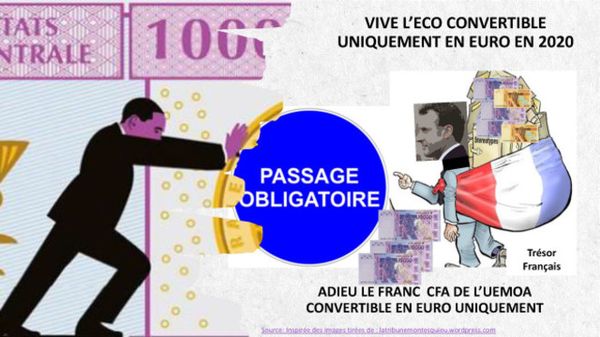
The member countries of the West African Economic and Monetary Union (WAEMU) are at a turning point. 2020 will see the adoption of the Eco, a new currency common to the 8 countries of the West African franc zone, that will replace the CFA franc.
The pressure exerted by sensitized masses, reflecting the breakthrough of civil society movements in the West African sub-region, have been powerful catalysts of change. To these movements, which waves also hit France, was coupled a pressure coming this time from the top of European leaders criticizing Paris grip on Africa and its arrogance. But in the first lights of 2020, this new currency, rejected by 6 countries of the Economic Community of West African States (ECOWAS), and which contours remain unclear, is viewed with increased distrust.
At the dawn of 2020 and a few days after a communiqué issued by the West African Monetary Zone (Nigeria, Ghana, Sierra Leone, Liberia, Gambia and Guinea-Conakry) in January16, 2020, denouncing a unilateral adoption of the Eco by WAEMU member countries accused of having betrayed the spirit of the new common currency, which launch is scheduled for this year, is a source of confusion. Within ECOWAS, the single currency project between Benin, Burkina Faso, Côte d’Ivoire, Guinea-Bissau, Mali, Niger, Senegal, Togo, Gambia, Ghana, Guinea, Liberia, Nigeria, Sierra Leone and Cape Verde, the first 8 of which use the CFA franc, has been on shelves for 30 years. The question of CFA franc’s future has risen to the top of the political agenda in 2018 and 2019. As a sign, several former French ministers of Economy and Finance, from Dominique Strauss-Kahn to Michel Sapin, have been pushed to speak their minds on the CFA, as were other leading political figures, including former French President Jacques Chirac.
Indeed, France was caught in a vice-like grip, subjected to pressure from above and from below. First of all, from the bottom: nearly 60 years after independence in the West African sub-region, with the rising awareness of masses, especially the youth concerning the conflict between the existence of the CFA franc on the one hand and the affirmation of full sovereignty on the other. An ultra-politicization caused by the breakthrough of a mosaic of sub-regional civil society movements, demonstrating once again the vitality of African civil society (such as the Anti-CFA franc Front), and the involvement of personalities such as Kako Nubukpo (Togolese macroeconomist) and Kemi Seba (president of Pan-Africanist Emergencies).
From the top then. In January and February 2019, declarations of Italian leaders Luigi di Maïo and Matteo Salvini, claiming that France impoverishes African countries with the CFA and does not deserve its current place in the concert of great powers, seem to have hit the mark. Taking off gloves, the two leaders, then at the head of a heterogeneous Italian coalition exceptionally found common ground. As a result, what had been simmering for some time happened. The declarations were followed by a serious diplomatic crisis between Paris and Rome, the culmination of which was France’s recall of its ambassador to Italy for « consultations ».
African leaders, just as much under the pressure of their bases, have been pushed to action. However, was it about reforming from top to bottom a booed and decrepit monetary system, or only about presenting appearances of change to populations thirsty for independence? Often severely criticized internally, accused of being soft, on the payroll of Paris and its interests on the continent, were African leaders correcting an institutional sophism or attempting to regain popularity by adopting Pan-Africanist attires?
Doubts about the real progress Eco would represent are partly based on the lack of credibility of actors involved in its adoption process and their proximity to France. Thus, while Abidjan had been in mid-June 2019 the launching city of the new currency’s name, the support of Ivorian President Alassane Ouattara alone is enough to arouse suspicion. One wonders: how can a firm defender of the CFA franc, considered one of France’s strongest allies in Africa, and who furthermore affirmed in February 2019 that the CFA was a « solid currency » and continues to defend a peg of the Eco to the Euro through France, suddenly turn into the bridgehead of a mobilization he has been fighting?
In « The Art of War » Sun Tzu teaches us, in a crude realism, that when a battle is lost, one must realize it as quickly as possible and retreat into a strategic repositioning with a firmer stand, for fear of being swept further back. Was the voice of the Chinese strategist, dated BC, heard by Paris? While its position had become untenable, did France make a strategic retreat to better reposition itself? Realizing that this front was compromised and victim of a popularity drop in Africa, was conceding ground intended at maintaining a place of interlocutor on the continent?
Paris repositioning seems to be characterized, among other things, by a clear interest in English-speaking countries. Thus, during a visit to Nigeria in July 2018, French President Emmanuel Macron engaged in a charm operation towards Africa’s leading economic power, including playing a basketball game in Lagos and percussions at the Shrine, a high place of culture and resistance on the continent. Beyond reconnecting with places trodden during his student years and seeking new economic partnerships in English-speaking Africa, was his visit also intended at convincing Nigeria, particularly reluctant, as shown by the January 16 communiqué, to join the new Eco currency? In addition, although French presence is poorly felt in Nigeria, it is nevertheless from this land that the French president has chosen to announce the cultural season « Africa 2020 » to be held in France.
One thing is certain, from Paris to Lomé via Dakar and Abidjan, to put the nail in the coffin of the CFA franc was an attempt to appease the blaze lit by social movements advocating monetary sovereignty, by siphoning off their most subversive language elements. It remains to be seen whether this announced change will fulfill all these promises, or will prove to be just a decoy in the form of a facelift.
Wuldath Mama

